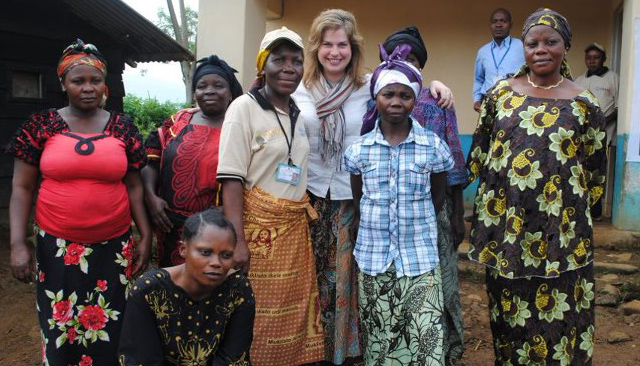A
s Thanksgiving approaches, I am always reminded of my first journey to the Democratic Republic of the Congo (DRC). It was a dream come true to visit this land I had heard so much about but could only imagine. Upon entering this lively and lush yet trampled and troubled place, I could feel the DRC and the spirit of the Congolese also entering my soul, taking up residence there.
The health and medical needs I confronted on that first trip marked my memory the most. Story after story of not being able to meet even the most basic of health concerns saddened and angered me, and I believe it is precisely those stories that led me to join the staff of IMA World Health. I visited several health centers doing their best to operate with the astoundingly meager resources they had. Blood transfusions were needed but a precious blood bank was hard to find. Performing surgeries and other medical procedures in the dark, without any power or a functioning electrical generator, I’ll never forget the staff at one health center telling me how they regularly performed C-section births by flashlight.
I wish I could say that this was atypical, but such is the state of healthcare the country-over. Hospitals and clinics in the DRC work under these kinds of conditions each and every day. In the midst of ongoing violent conflict, abject poverty, dysfunctional government, and the tragic irony of a lack of resources in a country rich with natural resources yet so exploited and abused by the outside world that they find themselves in a state of chronic deficiency, the Congolese still have to find a way to respond to the overwhelming health needs of their people and communities.
Somehow, they do it one day, one case, one life, one community at a time. And IMA World Health is there to accompany them.
Malaria is widespread across the DRC. Malnutrition is a terrible problem, caused by poverty, a lack of clean, accessible water, and a lack of protein in their diet. Water-borne diseases such as cholera and typhoid are also prevalent. HIV/AIDS is still spreading. Neglected tropical diseases that most of us in the U.S. have never even heard of pose yet another challenge for the Congolese. Sexual and violence against women and girls and the ensuing medical needs add another level of urgency to the already overwhelmed healthcare system.
Maternal mortality—the number of women dying during or right after childbirth—is alarming; many mothers experience post-partum hemorrhaging. Or, as is often the case, a woman begins labor but is hours away from a hospital or clinic and dies on her way. Add to that the economic reality that most people in the DRC make approximately $1 a day but the average hospital visit (Congolese hospitals work on a fee-for-service basis) is $3. If you’re among the lucky ones who are able to pay for the visit, you find yourself in the awful predicament of having covered the costs of your diagnosis but are then unable to pay for the treatment and medicines. Clinics, which are relatively less expensive, also operate on a fee-for-service basis and are often ill-equipped to provide people with the medicines they actually need to become well.
Heavyhearted by what seemed to be insurmountable public health challenges and the images of far too many Congolese sisters and brothers longing for proper health services, I embarked the flight back home. Mere moments into my flight I began to feel a bit queasy. For the next eight hours I sipped only ginger ale; I could feel myself coming down with something. Fortunately, I made it back home before I fully fell ill. What was first thought, by one doctor, to be malaria turned out to be just a severe case of gastroenteritis.
But I missed Thanksgiving. I missed the Macy’s Parade. I missed the turkey and mashed potatoes and gravy. I missed playing with my beloved nieces and nephew. I missed my family’s annual Christmas exchange dinner the next night. I missed the whole holiday.
Nonetheless, I was home. And the moment I knew I was really sick, I was able to pick up a phone, call my doctor and figure out what to do. I was immediately sent to the hospital for tests. I was then sent to an infectious disease doctor. Next I was sent for more blood work in an outpatient lab. I was driven home by my father and taken care of by my family who surrounded me with Gatorade, Saltine crackers, blankets, love and prayers. And I knew my doctor was only a phone call away; the hospital a short drive away; and one of the world’s premier medical institutions in the world, the Cleveland Clinic, a mere half an hour away.
My body was far from the DRC, and would quickly heal. But my heart ached knowing that what turned out to be a nasty stomach virus for me might have easily killed one of my new Congolese friends.
In some ways, that was the most authentic Thanksgiving I have ever had.

Rev. Amy Gopp stands among some of the Congolese women who inspired her so much during a visit to the Democratic Republic of Congo in 2011. She became the Vice President of External Relations for IMA World Health in August 2015.
Join me this holiday season in giving thanks for the work of IMA World Health, and for all the ways that IMA is responding to these tremendous healthcare challenges.
For more information on IMA’s work in the DRC, visit https://imaworldhealth.org/
In deep gratitude for your partnership,
Rev. Amy Gopp
Vice President of External Relations


